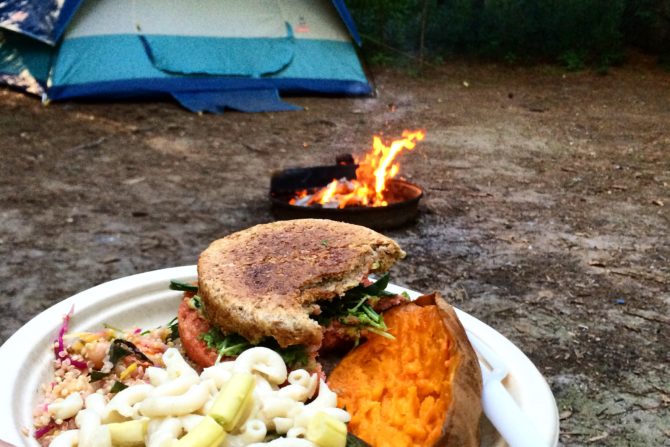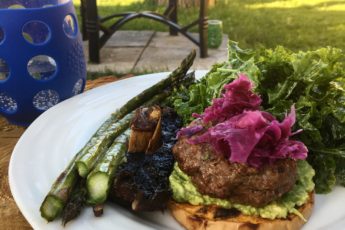Going camping for a long weekend as a plant based, eco minded person can be challenging for some. People devour hot dogs, hamburgers, chips, smores and other foods loaded with unhealthy fat, sodium, sugar, preservatives, providing little nutrients.
Camping and Healthy Food
Today I am going to help you discover healthy and energizing food options to bring on your camping trip other than a big bag of trail mix – although I do love a good trail mix! Plus some tips to remain healthy and safe so you get the most out of your trip.
The good thing about camping, is that often you can bring your car right into the campsite. That way you have ample room to bring extra stuff. Note a camping trip, is very different than a canoe trip!
1. Plan out your meals and your trip:
Before you leave, map out each meal and snack you will have for your trip. When you’re physically active you may eat more than you expect and this will help ensure that you don’t run out of food while you are in the woods! You can always switch up which days you are going to have each meal depending on what you are in the mood for. You will also want to get an idea of what you will need for the days you are camping. Are you doing activities or just going to be hanging around your campsite. All things to consider before you even get there!
2. Bring all the supplies you’ll need:
Prepare for the unexpected and pack supplies for all possible weather conditions or situations. Essentials include: warm clothes, a pot for boiling water, a first-aid kit, matches, a flashlight, a compass or GPS, a map, extra batteries, blankets, plates, reusable fork set, food, water and a camp stove. Do not forget to check the weather report before you leave and bring clothes and supplies appropriate for the weather. Of course, if there is a big thunderstorm coming, you might want to consider rescheduling your trip. However this didn’t stop me on my most recent camping trip. It made for a very unique experience.
3. Camping and healthy food – it’s all about prepping foods in advance:
It’s not as difficult as you might think to eat nutritiously while camping. When packing produce, bring pre-cut veggies in baggies or containers. Keep in mind that fruits and veggies that do not bruise easily will stay fresher and in shape while travelling, such as sugar snap peas, onion, bell peppers, zucchini, carrots, cucumber, grapes, apples, and oranges. Throw an ice pack in to keep things cool for as long as possible!
Tip: Prepare homemade foods in advance for the first night in case you’re running late or tired by the time you get set up. Some ideas include cooked grains (quinoa, brown rice), whole grain pasta salad, baked potatoes, homemade granola, trail mix, and veggie burgers.
Read below for some healthy food options to add to your menu:
Breakfast:
– Oatmeal, whole rolled oats in baggies and cooked over the camp stove in the morning. Sweeten it with honey, maple syrup or dried fruit and top with fruit, nuts, and seeds
– Apple or Pear plus some nut butter for a quick easy filling breakie
– Coconut or almond yogurt with homemade granola and fruit (Consume the yogurt for 1st breakfast on the trip)
– Plant based protein with almond or cashew milk in a shaker cup
Lunch:
– Sprouted grain tortillas loaded with anything from hummus, nut butter, avocado and veggies
– Snack bags of veggies with nut butter or hummus
– Salad in Mason Jars
– Cooked quinoa salad with beans
– Organic eggs, scrambled on a sprouted bun with veggie
Dinner:
– Mexican night – sprouted corn tortillas, salsa, veggies and beans
– Homemade veggie burgers or store bought ones like Hilary’s Eat Well
– Roasted organic corn on the cob
– Baked sweet potatoes
– Make your own pizza with sprouted grain tortillas, sheep or goat cheese, and tons of veggies
– Dehydrated veggies: Bring dehydrated veggies and then use hot water to rehydrate them into a hearty soup or chili
Snacks:
– Wash, cut and pre-pack fruits and veggies for snacks
– Protein bars made from natural ingredients
– Neal Brothers salsa and blue corn chips
– Organic dried fruit (sulfite-free)
– Nuts and seeds + mini dark chocolate chips
4. Be aware of your surroundings:
Wild animals can be dangerous so keep a safe, respectful distance. It is crucial that you don’t feed animals and keep your campsite tidy with food packed away when you are not eating. Find a tree away from the campsite and create a “Bear Bag” with all of your food to hang from a tree branch. This prevents animals from getting into your food and being attracted to your campsite by the smell.
In terms of plants, poison ivy is a common one to be careful of coming into contact with. It can cause an itchy skin rash and ruin your trip! If you do touch poison ivy, thoroughly wash the area with soap and water and make sure to change your clothes.
Know who to contact at the camp if it is an organized campsite or have an emergency number on hand if a situation does come up.
5. Drink safe water and keep hydrated:
Clean water sources may be limited while in the woods so you must be prepared. There are a couple of natural strategies to obtain clean drinking water. The most efficient way is to boil water until it is brought to a rolling boil for 1 minute to kill pathogens. Use a metal canteen, pot, or cup to do this.
In addition, a must-have for outdoor travelling is a good filter to reduce the amount of sediment, protozoa and bacteria in your water. Look for carbon or ceramic filters to ensure clean and delicious water – I like Katadyn brand filters which you can find at MEC and other camping stores.
Remember that running water, such as a spring or stream is your best bet. Standing water can be stagnant and a breeding ground for undesirables.
Also if you have filtered water at home, you can just fill up several large jugs of water before you go and be set with your own clean water. This may mean some extra weight and baggage, but it’s well worth it to have a clean water source that you trust!
6. Natural alternatives to bug spray:
In the woods there are mosquitos, ticks and other bugs you should protect yourself from. However, bug spray that is available on market contains potentially harmful chemicals and DEET. DEET is irritating to eyes, skin and airways as well as toxic to birds and aquatic life.
Herbal insect repellents only take a few minutes to make and you can experiment with a variety of herbal and essential oils. Lemon eucalyptus oil is thought to protect against mosquitos and possibly ticks. Other ingredients that may be effective include peppermint, rose geranium (for ticks), mint and citronella. In a small spray bottle, place equal parts of apple cider vinegar or witch hazel and an organic oil, such as almond oil, olive oil, or grapeseed oil. Then, place 10-15 drops of a combination of herbal or essential oils mentioned and shake it up. Some of my fave are rosemary, tea tree, eucalyptus, lemon, peppermint and lavender. Those together make an amazing blend to deter bugs.
Other than natural bug repellents, there are other methods to avoid getting bug bites. The first step is to wear long sleeves and pants especially at night. Make sure your clothing is not too thin as mosquitos can get through. Secondly, light a fire at night to keep the bugs away. Finally, don’t use any fragrances or perfumes while you are out camping, as the sweet smell can attract bugs.
7. Natural Skin Protection:
Protecting yourself from the sun is critical if you are going to be outside all day. Commercial sunscreens contain many questionable chemicals and there are various all-natural techniques to protect you from the sun. Read more about natural alternatives for sunscreen to bring on your camping trip in a recent blog post: What’s the best sunscreen for me and my children?
Enjoy the outdoors and quality time with your friends and family! How do you stay healthy while camping?
Take a few minutes listen to what Jesse and I packed on our most recent camping trip on The Ultimate Health Podcast:



